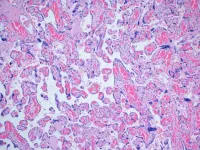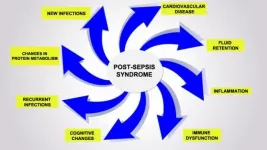(Press-News.org) New research at Karolinska Institutet in Sweden suggests a link between psychosis and a genetic change that affects the brain's immune system. The study published in Molecular Psychiatry may impact the development of modern medicines for bipolar disorder or schizophrenia.
Psychosis affects approximately 2-3 per cent of the population and is characterized by a change in the perception of reality, often with elements of hallucinations and paranoid reactions.
Most of the people affected are patients with schizophrenia, but people with bipolar disorder may also experience psychotic symptoms.
The antipsychotics available today often have insufficient efficacy, and for patients, their life situation can be difficult.
The average life expectancy of people with schizophrenia is approximately 15 years shorter than that of the general population, according to Sweden's National Board of Health and Welfare.
"It is not entirely known what biological mechanisms cause psychosis, but recent research suggests that immune activation in the brain's glial cells may be the cause. People with psychosis have elevated levels of kynurenic acid in the brain, a messenger that transmits information from the brain's immune system to the neurons," says Goran Engberg, Professor at the Department of Physiology and Pharmacology, Karolinska Institutet, and the study's corresponding author.
Previous genome-wide association studies (GWAS) have shown that the protein GRK3 expresses itself via genetic changes in the immune system in patients with psychosis.
Now researchers at Karolinska Institutet, the University of California, San Diego, USA, and the Mayo Clinic, Rochester, USA, have studied more specifically which parts of the immune system impact psychotic disorders.
The study is based on extensive data from mice that lack the GRK3 protein in the brain, as well as an analysis of the genome from 70 people with bipolar disorder and 48 healthy control subjects.
Results show that the loss of the GRK3 protein appears to increase the sensitivity of the immune system and triggers a cascade of effects in the brain, involving an increased release of the cytokine IL-1beta and kynurenic acid.
"Our experimental data are confirmed through genetic studies where we see a link between psychosis in patients with bipolar disorder and decreased expression of GRK3, which leads to an increased amount of kynurenic acid in the brain," says Carl Sellgren. He is a senior lecturer at the Department of Physiology and Pharmacology, Karolinska Institutet, and the study's first author together with Sophie Imbeault, senior researcher at the same department.
The data in the study provide a connection between immune activation and psychosis and thus presents a starting point for further study of novel antipsychotic drugs possessing immune modulatory functions.
The drugs currently used in psychosis treatment were developed in the 1960s.
"To develop effective, modern drugs, more knowledge is needed about the mechanisms in the brain that can trigger psychosis," says Sophie Erhardt, professor at the Department of Physiology and Pharmacology, Karolinska Institutet, and the study's last author.
INFORMATION:
The study was funded by the Swedish Research Council, The KI-AstraZeneca Translational Science Centre Joint Research Program, the Torsten Soderberg Foundation, the Foundation for Strategic Research and the Brain Foundation, Petrus and Augusta Hedlund Foundation, Marta Lundqvist Foundation, Ahlen Foundation, National Institute of Mental Health, the Stanley Medical Research Institute, Region Stockholm-Karolinska Institutet's ALF Agreement for Clinical Research and Medical Education, the Broad Institute, the Knut and Alice Wallenberg Foundation, the Mayo Clinic - Karolinska Institutet Collaborative Project Grant.
Carl Sellgren is a scientific advisor to Outermost Inc, USA. Doo-Sup Choi sits on the board of Peptron Inc, USA, and Maria Bhat is employed by AstraZeneca. There are no other reported conflicts of interest.
Publication: "GRK3 deficiency elicits brain immune activation and psychosis." Carl M. Sellgren, Sophie Imbeault, Markus K. Larsson, Alfredo Oliveros, Ida A.K. Nilsson, Simone Codeluppi, Funda Orhan, Maria Bhat, Maximillian Tufvesson-Alm, Jessica Gracias, Magdalena E. Kegel, Yiran Zheng, Anthi Faka, Marie Svedberg, Susan B. Powell, Sorana Caldwell, Mary E. Kamenski, Marquis P. Vawter, Anton Schullman, Michel Goiny, Camilla I. Svensson, Tomas Hokfelt, Martin Schalling, Lilly Schwieler, Simon Cervenka, Doo-Sup Choi, Mikael Landen, Goran Engberg, Sophie Erhardt. Molecular Psychiatry, online 12 May 2021, doi: 10.1038/s41380-021-01106-0.
Anyone who's raised a child or a pet will know just how fast and how steady their growth seems to be. You leave for a few days on a work trip and when you come home the child seems to have grown 10cm! That's all well and good for the modern household, but how did dinosaurs grow up? Did they, too, surprise their parents with their non-stop growth?
A new study lead by Dr Kimberley Chapelle of the American Museum of Natural History in New York City and Honorary Research Fellow at the University of the Witwatersrand suggests NOT. At least for one iconic southern African dinosaur species. By looking at the fossil ...
Can you feel the heat? To a thermal camera, which measures infrared radiation, the heat that we can feel is visible, like the heat of a traveler in an airport with a fever or the cold of a leaky window or door in the winter.
In a paper published in Proceedings of the Royal Society A: Mathematical, Physical and Engineering Sciences, an international group of applied mathematicians and physicists, including Fernando Guevara Vasquez and Trent DeGiovanni from the University of Utah, report a theoretical way of mimicking thermal objects or making objects invisible to thermal measurements. And it doesn't ...
A study across 55 hospitals in Queensland, Australia suggests that a recent state policy to introduce a minimum ratio of one nurse to four patients for day shifts has successfully improved patient care, with a 7% drop in the chance of death and readmission, and 3% reduction in length of stay for every one less patient a nurse has on their workload.
The study of more than 400,000 patients and 17,000 nurses in 27 hospitals that implemented the policy and 28 comparison hospitals is published in The Lancet. It is the first prospective evaluation of the ...
CHICAGO --- A new Northwestern Medicine study of placentas from patients who received the COVID-19 vaccine during pregnancy found no evidence of injury, adding to the growing literature that COVID-19 vaccines are safe in pregnancy.
"The placenta is like the black box in an airplane. If something goes wrong with a pregnancy, we usually see changes in the placenta that can help us figure out what happened," said corresponding author Dr. Jeffery Goldstein, assistant professor of pathology at Northwestern University Feinberg School of Medicine and a Northwestern Medicine pathologist. "From what we can tell, the COVID vaccine does not damage the placenta."
The study will be published May 11 in the journal Obstetrics ...
TORONTO, ON - Geoscientists at the University of Toronto (U of T) and Istanbul Technical University have discovered a new process in plate tectonics which shows that tremendous damage occurs to areas of Earth's crust long before it should be geologically altered by known plate-boundary processes, highlighting the need to amend current understandings of the planet's tectonic cycle.
Plate tectonics, an accepted theory for over 60 years that explains the geologic processes occurring below the surface of Earth, holds that its outer shell is fragmented into continent-sized blocks of solid rock, called "plates," that slide over Earth's mantle, the rocky inner layer above ...
An article published in Frontiers in Immunology suggests that sepsis can cause alterations in the functioning of defense cells that persist even after the patient is discharged from hospital. This cellular reprogramming creates a disorder the authors call post-sepsis syndrome, whose symptoms include frequent reinfections, cardiovascular alterations, cognitive disabilities, declining physical functions, and poor quality of life. The phenomenon explains why so many patients who survive sepsis die sooner after hospital discharge than patients with other diseases or suffer from post-sepsis syndrome, immunosuppression ...
COVID-19 has had a significant impact since the pandemic was declared by WHO in 2020, with over 3 million deaths and counting, Researchers and medical teams have been hard at work at developing strategies to control the spread of the infection, caused by SARS-COV-2 virus and treat affected patients. Of special interest to the global population is the developments of vaccines to boost human immunity against SARS-COV-2, which are based on our understanding of how the viral proteins work during the infection in host cells. Two vaccines, namely the Pfizer/BioINtech and Oxford/AZ vaccine rely on the use of delivering the gene that encodes the viral spike protein either as an mRNA or through an adenovirus vector to promote the production of relevant antibodies. The use of monoclonal ...
In order to make meaningful gains in cardiovascular disease care, primary care medical practices should adopt a set of care improvements specific to their practice size and type, according to a new study from the national primary care quality improvement initiative EvidenceNOW. High blood pressure and smoking are among the biggest risk factors associated with cardiovascular disease. Primary care physicians help patients manage high blood pressure and provide smoking cessation interventions.
Researchers found that there is no one central playbook for all types of practices, but they did identify ...
Although new family medicine graduates intend to provide a broader scope of practice than their senior counterparts, individual family physicians' scope of practice has been decreasing, with fewer family physicians providing basic primary care services, such pediatric and prenatal care. Russell et al conducted a study to explore family medicine graduates' attitudes and perspectives on modifiable and non-modifiable factors that influenced their scope of practice and career choices. The authors conducted five focus group discussions with 32 family physicians and explored their attitudes and perspectives on their desired and actual scope of practice. Using a conceptual framework ...
In the decade since the advent of CRISPR-Cas9 gene editing, researchers have used the technology to delete or change genes in a growing number of cell types. Now, researchers at Gladstone Institutes and UC San Francisco (UCSF) have added human monocytes--white blood cells that play key roles in the immune system--to that list.
The team has adapted CRISPR-Cas9 for use in monocytes and shown the potential utility of the technology for understanding how the human immune system fights viruses and microbes. Their results were published online today in the journal Cell Reports.
"These experiments set the stage for many more studies on the interactions between major infectious diseases and human immune cells," says senior author Alex Marson, MD, PhD, director of the Gladstone-UCSF Institute ...




